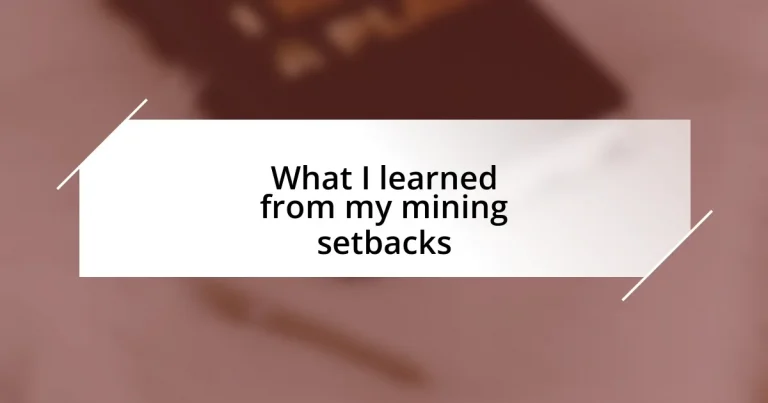Key takeaways:
- Setbacks in mining reveal the need for thorough planning and the ability to learn from failures, fostering resilience and innovation.
- Effective risk management through routine assessments and contingency plans minimizes disruptions and boosts team morale.
- Maintaining a positive mindset and embracing flexibility during crises can lead to creative problem-solving and team cohesion.
- Building resilience involves vulnerability and open discussions about mistakes, enhancing trust and collaborative growth within the team.
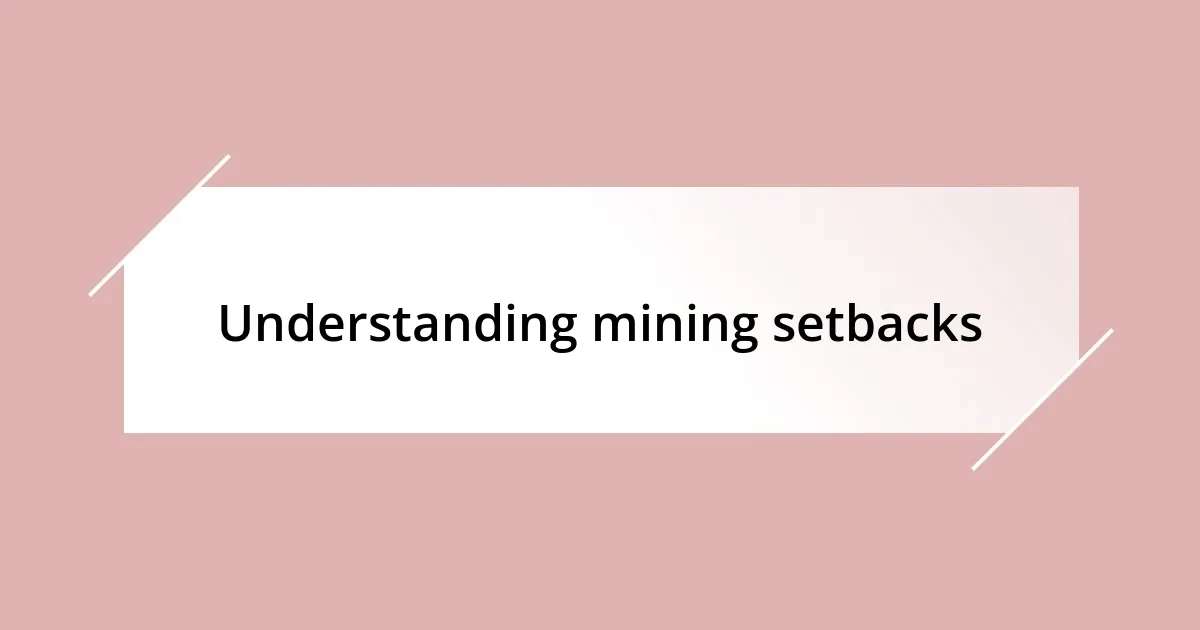
Understanding mining setbacks
Mining setbacks often come from unexpected challenges, such as equipment failure or regulatory changes. I remember a time when a crucial piece of machinery broke down during a crucial extraction phase. The panic was palpable; I felt the weight of potential losses, not just financially, but also in terms of time and resources.
It’s interesting how setbacks can strip us of our illusions of control. Have you ever found yourself in a situation where everything seemed to be going smoothly, only to have it all come crashing down? I certainly have, and those moments have been humbling. Each setback I’ve faced taught me a profound lesson about resilience, pushing me to adapt and rethink my approach.
Moreover, the emotional rollercoaster that accompanies setbacks is often overlooked. There was one instance when a project I poured my heart into didn’t yield the expected results. I felt disappointment, but it was also a turning point. In hindsight, those emotional highs and lows not only molded my character but also deepened my understanding of the mining industry’s unpredictable nature.

Lessons from past mistakes
One of the most significant lessons I’ve learned from my mining setbacks is the importance of thorough planning and preparation. There was a time when I underestimated the logistical challenges of transporting materials from a remote site. I assumed everything would go smoothly because it had in the past, but the reality was a series of unexpected delays. This experience taught me that a comprehensive plan, especially one that accounts for potential disruptions, is essential.
Another takeaway has been the value of learning from failures instead of fearing them. On one occasion, my team mishandled an environmental assessment, which led to costly compliance issues. Rather than dwell on the mistake, I organized a post-mortem meeting where we could openly discuss what went wrong and how to improve. This approach not only fostered transparency but also encouraged innovation, proving that setbacks can fuel growth if we allow ourselves to learn from them.
Lastly, I realized the importance of building a supportive team culture. After a particularly challenging project, morale was low among my crew, and I noticed a shift in their motivation. I decided to host a team-building event focused on sharing experiences, where members could tell their own stories of setbacks and successes. This gathering transformed our mindset; we emerged stronger and more united, understanding that we could rely on each other during tough times.
| Lesson | Anecdote |
|---|---|
| Thorough Planning | Underestimated logistics, leading to delays. |
| Learning from Failures | Post-mortem meeting after mishandling an environmental assessment. |
| Supportive Team Culture | Team event that transformed our mindset after a challenging project. |
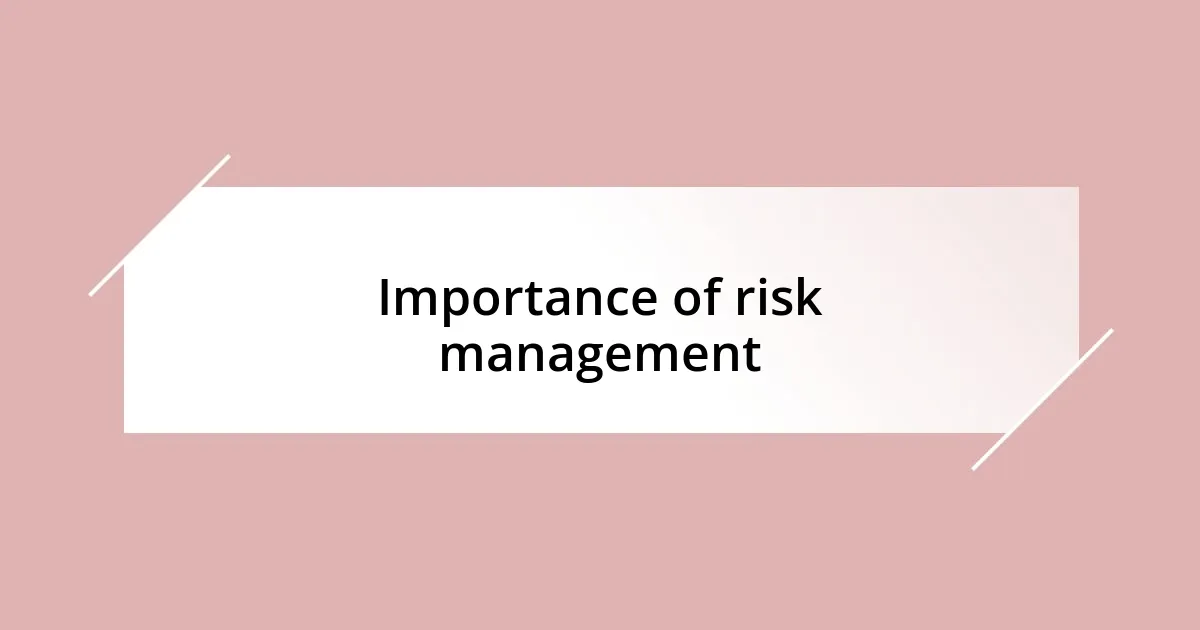
Importance of risk management
Managing risks effectively has been a game-changer in my mining experience. One of the toughest moments I encountered was during an unexpected regulatory shift that threatened to halt operations. In that scenario, I quickly realized that having a risk management plan in place could have minimized disruption. It felt like a lightbulb moment, where I grasped the true essence of being proactive rather than reactive.
- Risk assessments should be a routine part of our planning.
- Prepare contingency plans tailored to various potential scenarios.
- Foster open communication with the team about risks on the ground.
- Continuously evaluate and update risk strategies as new information arises.
These practices not only reduce uncertainties but also bolster team morale because we all feel more prepared and supported. I’ve found that it creates a shared sense of responsibility, turning what once felt intimidating into an opportunity for collaboration and growth. Reflecting on my journey, I can’t stress enough how crucial risk management is in navigating the unpredictable landscape of mining.
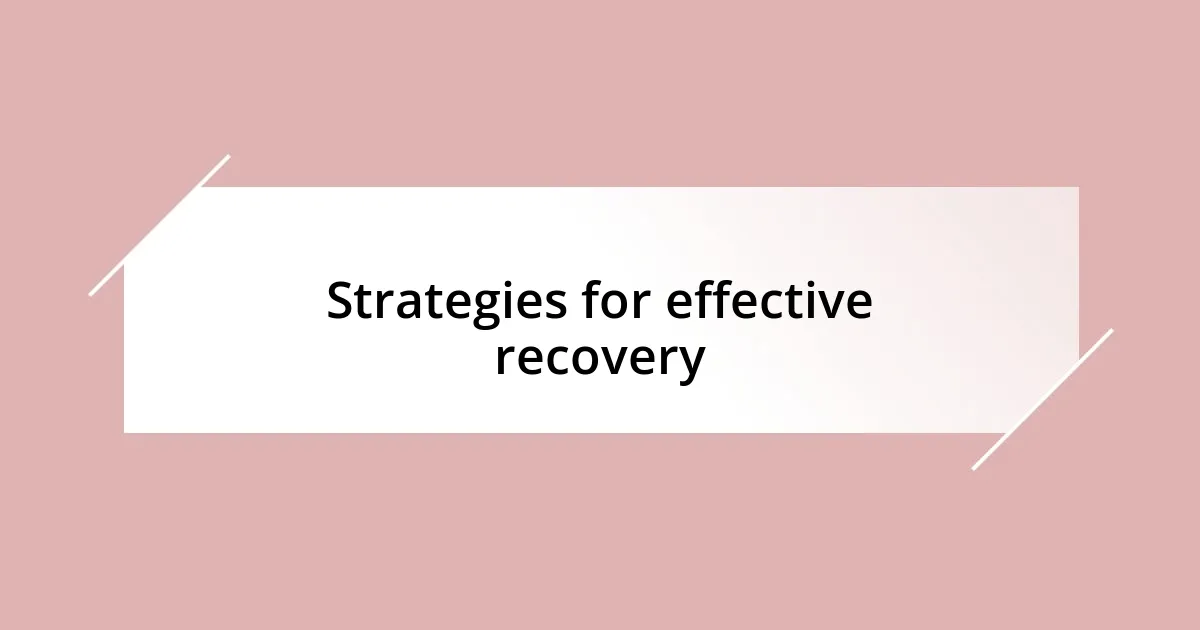
Strategies for effective recovery
When it comes to effective recovery after setbacks in mining, I’ve learned that a flexible approach is vital. There was a moment when a sudden equipment failure during a critical phase left us scrambling. Instead of panicking, I encouraged my team to brainstorm alternative solutions on the spot. This collective problem-solving not only led to an innovative workaround but also instilled a sense of ownership among the crew. How often do we miss opportunities because we don’t allow ourselves the space to think creatively during a crisis?
Another strategy I found invaluable is the importance of maintaining a positive mindset, even when the situation looks bleak. I remember a project where everything seemed to go wrong; from weather disruptions to unexpected costs, it felt overwhelming. I realized that by reinforcing a can-do attitude and celebrating small wins along the way, we can shift the narrative. A simple acknowledgment of progress can uplift spirits. Have you ever noticed how a bit of positivity can energize a team even in the toughest moments?
Lastly, I can’t stress enough the role of reflective practice in recovery. After each setback, I took time to personally reflect on what went wrong and what I could have done differently. I began journaling these insights, which served not only as a record of lessons learned but also as a source of motivation for future projects. Isn’t it interesting how putting our thoughts into words can clarify our perspectives and prepare us for the next challenge? It’s a simple yet powerful strategy that I now advocate for anyone in the industry.
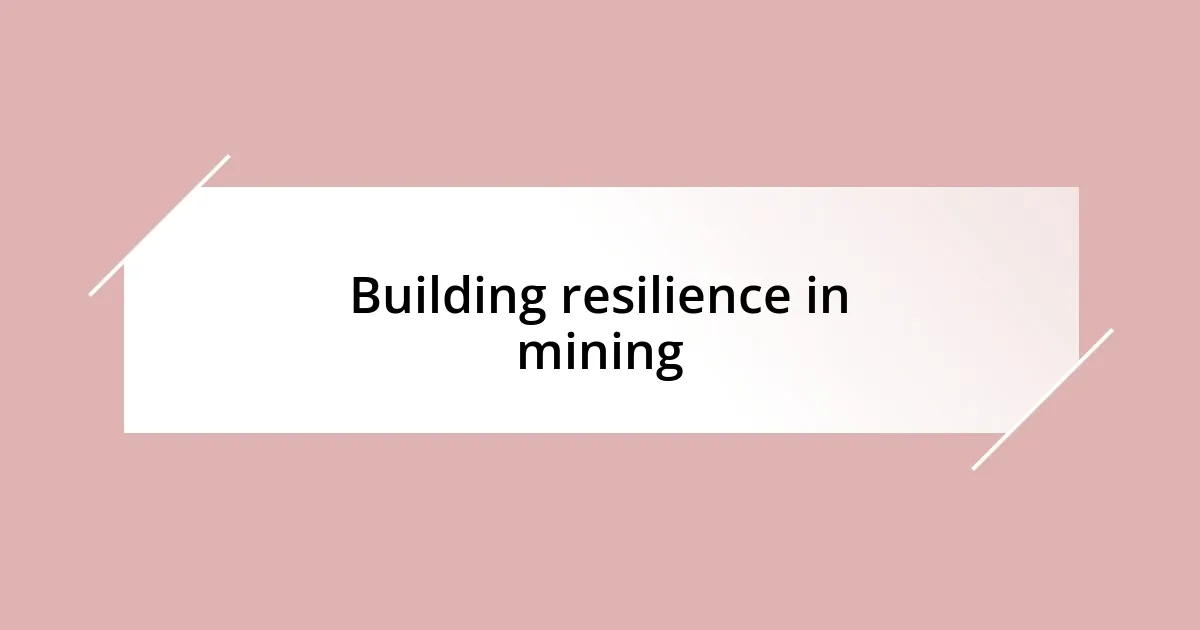
Building resilience in mining
Building resilience in mining often requires an inner strength that goes beyond technical skills. I vividly recall an instance where a weather-related delay nearly derailed one of our key projects. Instead of succumbing to frustration, I urged my team to focus on what we could control—our communication and planning. It was enlightening to see how fostering a supportive atmosphere helped everyone rally together, transforming what could have been a setback into a bonding experience.
In facing adversity, I’ve discovered that adaptability is essential. There were days when shifts in market demand caught us off guard, placing significant pressure on our operations. During those challenging moments, I learned to embrace a mindset that welcomes change. I found it liberating to pivot our strategies quickly, and I began to see setbacks as opportunities for innovation. Have you ever experienced that feeling of possibility when you shift your perspective?
Moreover, cultivating resilience means embracing vulnerability. There’s a certain strength in admitting when things go wrong. I remember sharing my own missteps with the team after a costly oversight in project assessment. The honest discussion that followed not only deepened our trust but also encouraged team members to share their own experiences openly. It reminded me that in mining, as in life, it’s okay not to have all the answers. Sometimes, the greatest resilience comes from learning together and supporting each other through the tough times.
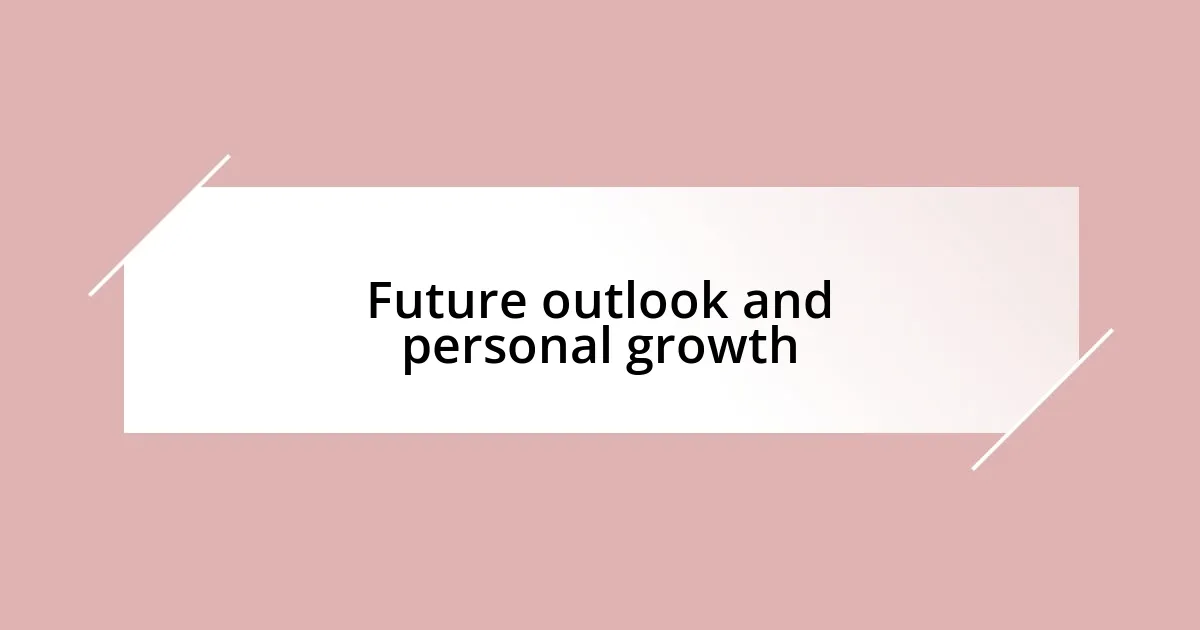
Future outlook and personal growth
There’s something humbling about setbacks that really makes you reevaluate your path. I recall when a significant equipment malfunction forced me to take a step back and reassess our strategies. Instead of feeling defeated, I found that this pause allowed me to gain a clearer perspective on our goals and how to achieve them moving forward. Isn’t it fascinating how a moment of adversity can redirect our focus in a way we never anticipated?
Reflecting on those setbacks, I see them as invaluable lessons that contributed to my personal growth. Each stumbling block forced me to develop new skills and approaches that I would not have considered otherwise. For example, after encountering a major logistic hiccup, I delved into project management techniques I had previously overlooked. The result? Increased efficiency and better team collaboration in our subsequent ventures. Wouldn’t you agree that some of our best learning comes from the moments we least expect?
Looking ahead, I genuinely believe that these experiences have shaped a more resilient leader in me. I find joy in mentoring others, sharing insights from my setbacks, and encouraging them to view challenges as growth opportunities. The more we share our stories, the more robust our community becomes, right? I’m excited about what lies ahead, knowing that every challenge I face has the potential to enrich both my journey and those around me.












